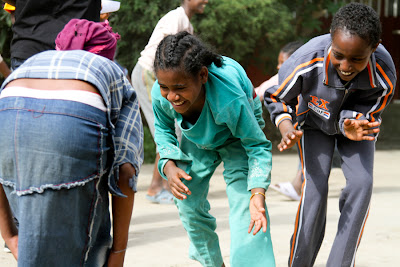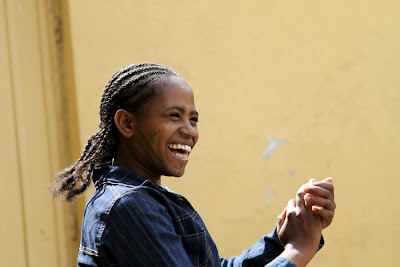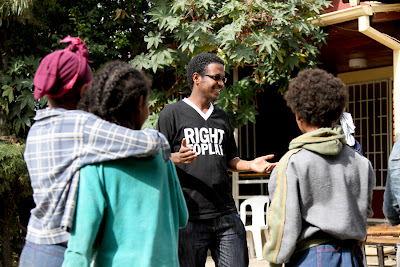“It is very possible to be raped, abused, or even killed,” says Yeshi, one of the 13-year old girls. Although most claim that they are 13, the truth is that many of them simply do not know how old they are. “And some of us have no family, so this is family.”
 The family she speaks of is the sisterhood of around thirty girls that live at this orphanage in Megenagna (meg-a-NAN-ya). Coincidentally, the word megenagna means “meeting place,” and the girls, found on the street, are brought here by social workers to join OPRIFS. The main goal of the Organization for Prevention, Rehabilitation, and Integration of Female Streetchildren is to reunite them with their families and promote a healthy family environment. Their Behavioral Observation Plan identifies individual behavioral issues, and an external referral system is used as a supplement to ensure the girls can be treated for problems that OPRIFS does not have the expertise to handle. During their three to six month stay here at the orphanage the girls are given Alternative Basic Education, which includes AIDS/HIV education, leadership training, and social education through sport. It is the sport program we see today, and it is administered by an OPRIFS worker trained by Right To Play in their signature Red Ball Child’s Play module.
The family she speaks of is the sisterhood of around thirty girls that live at this orphanage in Megenagna (meg-a-NAN-ya). Coincidentally, the word megenagna means “meeting place,” and the girls, found on the street, are brought here by social workers to join OPRIFS. The main goal of the Organization for Prevention, Rehabilitation, and Integration of Female Streetchildren is to reunite them with their families and promote a healthy family environment. Their Behavioral Observation Plan identifies individual behavioral issues, and an external referral system is used as a supplement to ensure the girls can be treated for problems that OPRIFS does not have the expertise to handle. During their three to six month stay here at the orphanage the girls are given Alternative Basic Education, which includes AIDS/HIV education, leadership training, and social education through sport. It is the sport program we see today, and it is administered by an OPRIFS worker trained by Right To Play in their signature Red Ball Child’s Play module. Upon arrival we are met by a stone-faced (she was all smiles when we departed) female security guard who lets us into the orphanage complex. The small area has a dorm, classroom, wash facilities, and of course a small open area to play. We greet everyone and two minutes later we join the girls in a warm-up game of tag and a follow the leader directional game. Trained youth leaders run group discussions about the life lessons associated with a series of games.
Upon arrival we are met by a stone-faced (she was all smiles when we departed) female security guard who lets us into the orphanage complex. The small area has a dorm, classroom, wash facilities, and of course a small open area to play. We greet everyone and two minutes later we join the girls in a warm-up game of tag and a follow the leader directional game. Trained youth leaders run group discussions about the life lessons associated with a series of games. Gadise stands out, both as the strongest youth leader and for the tattoo on her jaw line, a distinguishing characteristic of the different rural communities in northern parts of Ethiopia. From beginning to end, she pays attention to everyone, making sure all the girls are active participants. It is clear that the girls care for one another and that the staff and youth leaders foster these relationships. Gadise believes that the girls must change their own lives. “God gave us this shelter. We must find families.” Knowing well that not all girls have blood relatives, she meant that every girl here must actively be involved in a family unit.
Gadise stands out, both as the strongest youth leader and for the tattoo on her jaw line, a distinguishing characteristic of the different rural communities in northern parts of Ethiopia. From beginning to end, she pays attention to everyone, making sure all the girls are active participants. It is clear that the girls care for one another and that the staff and youth leaders foster these relationships. Gadise believes that the girls must change their own lives. “God gave us this shelter. We must find families.” Knowing well that not all girls have blood relatives, she meant that every girl here must actively be involved in a family unit.In what begins as an introduction to the Kickabout team, Ashley is prompted to demonstrate some West African dance that she has studied at the University of Minnesota. She is nervous at first, not wanting to mess up. But dance, like football, serves to connect and no common verbal language is necessary. Wonderfully, what she starts is a celebration of individual expression. (see below)
 A dance circle forms, and different girls come forward to demonstrate their regional and tribal dances. Interestingly, the girls that dance are different than the girls that are verbal leaders or that dominate the games. There is no one way to lead, and this group appreciates the uniqueness of each individual’s leadership capabilities. They celebrate everyone, and afterward we break for tea and roasted barley, and get to know a little more about the man that cultivates this atmosphere.
A dance circle forms, and different girls come forward to demonstrate their regional and tribal dances. Interestingly, the girls that dance are different than the girls that are verbal leaders or that dominate the games. There is no one way to lead, and this group appreciates the uniqueness of each individual’s leadership capabilities. They celebrate everyone, and afterward we break for tea and roasted barley, and get to know a little more about the man that cultivates this atmosphere.Hussein Abamacha is the primary social worker here at the orphanage. Physically disabled, he was a street child himself before a social worker collected him from the street and sent him to get an education with an organization similar to that of OPRIFS. Hussein received training to be a teacher and then joined OPRIFS. Three years ago he was trained by Right To Play National Training Office, Melaku Tekola, in the Red Ball Child Play program. The once shy, quiet man lacking confidence now sports a bright yellow “YOU CAN” tee shirt.
 “Through OPRIFS and Right To Play training I have learned a lot about myself. I use my training and communication skills to make relationships with others and help these children to have a better life.” With the sport development training he can also now do physical exercise with the children. Smiling, he explains, “I have forgotten about my physical disability.”
“Through OPRIFS and Right To Play training I have learned a lot about myself. I use my training and communication skills to make relationships with others and help these children to have a better life.” With the sport development training he can also now do physical exercise with the children. Smiling, he explains, “I have forgotten about my physical disability.”Hussein shines as a role model both for disabled Ethiopians and for the young girls that he teaches. He doesn’t see himself as a leader, but everyone else sees his personal success, love for his work, and determination to improve the lives of others as inspirational.
Eli puts it best when he explains to Hussein, “My friend…when you smile, the girls smile, the other staff smile, we smile, and then finally, the security guard even smiles.” Laughter ensues and we can only hope Hussein realizes how extraordinary he is.
March 18th, 2010
9th of Megabit (the 7th month), 2002








2 comments: on "Right To Play: Megenagna"
Clearly this is my favorite video so far! Soooo cute.
I realy loved it, interesting. so nice!!!
Post a Comment